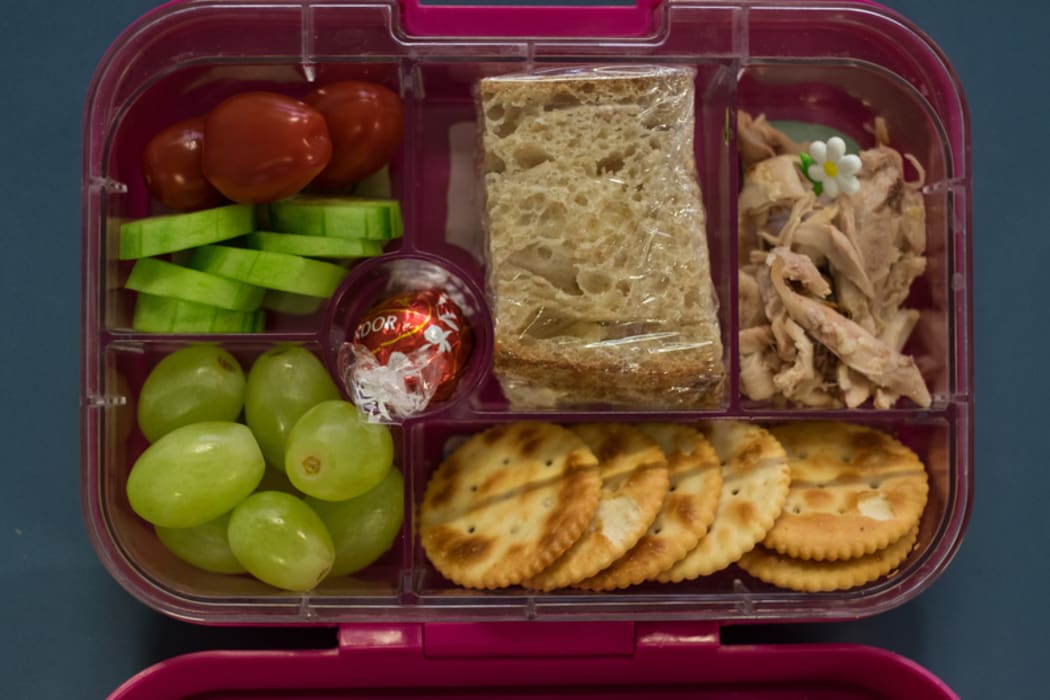Schools and parents always want the best for children, but researcher Rebekah Graham has opened a can of worms by denouncing rigid rules and expectations around school lunchbox food, particularly for those below the breadline.

Photo: RNZ / Brad White
There are lots of rules and regulations at schools - children must wear a uniform, no peanut butter in case of allergies - which parents have to adhere to.
Some are written rules, others cultural. When it comes to packed lunches it can be a mixture of the two.
So when do well-meaning guidelines become shaming? And how does that affect those parents who may not have the time or money to provide what is expected of them?
Dr Graham has written a piece for The Spinoff calling for an end to what she calls lunchbox shaming. She says the article's generated plenty of responses to something "nobody really talks about".
"It seems that there's quite an issue there around who determines what's acceptable food, and how that gets determined," she says.
"Even what parents themselves think around what sort of food their kid should be eating is incredible complex."
She says it's a class issue, with people giving greater status to foods which are prepared in the home.
"A mother said to me 'we have had conversations, the children and I, about whether it's ok to eat food that someone else has thrown away or to go into a rubbish bin to pick out an item that somebody else has discarded.
"This is the reality of what some people are facing, is survival and doing their best to survive, and again it's sort of hidden because people are so ashamed they don't really admit that that's what's happening."
She says the way we treat people for their food choices can have a powerful effect.
"I think we need to work on giving positive messages around food in a way that's a lot more supportive and encouraging first.
"When we shame people for the food they eat it just makes it worse. It makes it even harder for people to acknowledge they're struggling, even harder to ask for help, even harder to talk honestly about what's happening."
Indeed, obesity is in many ways tied to poverty.
"I know we want to think people are obese because they're not eating the right foods, but often it's a lot more complicated than that.
"People mean well but obesity tends to be connected with stress and poverty and insecurity around food - so it's around not having consistent regular meals and enough food regularly as well as the stress and the concern and the worry.
"What are your options when you don't have a lot of money? They tend to be processed foods that are going to last a long time, and they tend to have a lot more sugar.
"Healthy is such an amorphous term now and gets used in so many different ways. One example perhaps is ... 'le snaks' which were criticised as being heavily processed and 'why don't you just get a block of cheese and cut that up'.
"The difference of course is: one is you're cutting it up yourself and putting it in a container, and the other one is prepackaged.
She says it can be hard to really know what is having an effect on New Zealand children.
"There's very little actual rigorous robust research around what children are eating at school, differences between schools and even differences between regions.
She thinks the solution may be in providing support for those who need it.
"Some schools seem to be really great at talking with parents … other schools seem to be a lot more prescriptive and a lot more policing of food.
"Where we resource families sufficiently to be able to live, the money predominantly goes on more food, better quality food and items for the children so that where household incomes go up the quality of the food on offer and the consistency of the quality of the food on offer also increase."

